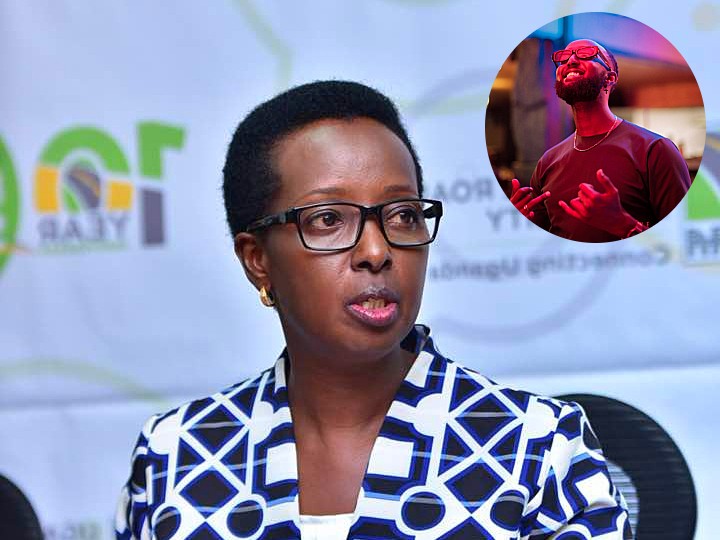Allen Kagina, the executive director Uganda National Roads Authority (UNRA) says she has raised her sons to understand that having dreadlocks and wearing earrings neither defines who they are nor does it take away their personal attributes.
She says there is no manual on parenting and thankfully so, in her opinion. If there was, then humanity would lack the diversity it possesses and everybody would be engineered like a robot, she argues.
“Nobody wants a world full of the same people,” says the former head of Uganda Revenue Authority (URA).
“I have raised them to know that they are approved. They don’t need to come into the gate in a form or picture of what I like. They don’t need to say ‘This is what mummy will accept and therefore let me detach the dreadlocks or remove the earrings’. The dreads or the earrings or the torn jeans don’t make who Mark is. Mark is Mark as God gave him to us,” Kagina adds while explaining the model with which she has raised her three kids, Mark, Dan and Michelle.
Fear tends to push kids to display certain characteristics when they are around their parents. Even when they harbor other habits considered unsavory to their parents. The downside of this is that fear builds a wall and eliminates any chances for kids to open up to their parents about what challenges they face.
A contrary school of thought, which is a popular model for parenting in Africa, is that this same fear keeps children in check and molds them into responsible adults.
Kagina says theirs (she and her husband, Paul Kagina) was to raise their children, steward them, and set them free. The civil servant adds that communication is critical in parenting.
And that part of the things that shape children are the hard knocks from life outside home.
“You have got to leave the door open for discussion. If they ever feel they’ve come to a point where they cannot speak to us, then we have closed that door. You try and make every effort to keep it open,” Kagina said in an interview with rapper Wonder JR which she did alongside her son, Mark.
It is through that discussion that each side listens and understands the other. It is from the listening that the mother of three finally got comfortable with the idea of the son – Mark Kagina Ruranga – wearing earrings. Initially, it was weird to wrap her head around.
“I was like, huh? How am I gonna explain this to my family?”
To her surprise, or relief, Mark’s auntie (who’s older than Mark’s mom) instead complimented the look.

“We have a very interesting family. He (Mark) came with dreads and they said exactly the same thing (compliments).”
Kagina is a sister to Lorna Magara (current and first female Chairperson of Council at Makerere University) and Jocelyn Kyobutungi Rugunda, wife to former Prime Minister Dr Ruhakana Rugunda.
She says that after a few days, it sunk in that the locs were actually okay.
Her reasoning is, one’s character is not defined by what they wear on the outside.
In Uganda, dreadlocks (for men) represent two things – either you are a musician or you’re a Rastafarian. That stereotype remains true be it at in the workplace, at school and within the general society. Many parents still associate the locs with hooliganism and drugs. Yet Kagina who is among the most reputable civil servants on top of her strong rooting in religion, is open-minded on the issue.
“The real person still comes out, Mark is not the earring. It’s just really understanding that the real person is actually there, and that is who you relate with. You don’t relate with hair or something else. You relate with the real person.”

Though, Mark’s dad, who is more traditional wasn’t as easy to get on board to approve of this unconventional culture. Mark had to convince him enough and explain that the dreadlocks don’t define him and that he likes them.
To sell this further, he tried to allay the dad’s fears by reminding him he (Mark) would be bald in a few years anyway. So why fuss about it? The dad is bald.
According to Mark, maintaining a relationship with his parents is key. It is the oil that prevents possible friction.
“I grew up understanding the relationship with my parents is paramount. Also, there are some things I’m not going to do in their presence. Out of respect. At the core of myself I have to show them I’m who the raised,” he says.

In as much as parents ought to be liberal and willing to listen, he says he would not come home at 8am drunk hoping his parents will listen to him.
On her part, Allen Kagina underscores the fact that there has to be a limit when it comes to how far children can go down a certain path. Whether their traits are conditioned by cultures they have been exposed to. Beyond that limit, conformity can end up affecting the person inside.
Understanding the differences in point of view means you have to appreciate that times have changed. Mark’s mom does.
The understanding of work has evolved quickly over the last two decades, mainly influenced by the reliance on the internet. The digital age has also heavily facilitated the birth of a creative economy where more and more young people are departing from activities that were traditionally categorized as jobs, and settling for activities that involve creating, producing, and distributing goods and services that use creativity and intellectual capital as primary inputs.
Parents have had to contend with a shift in work dynamics coupled with Uganda’s high rates of unemployment which have led to graduates to look to advertising, arts and crafts, design, fashion, film, video, photography, music, performing arts, publishing, television and radio and the like, for employment.
The cultural and creative industries generate $2,250bn a year (3 percent of the world GDP) and employ 29.5 million people (1 percent of the world’s active population), according to a 2022 report by UNESCO and Ernst & Young.
Revenue generated by the cultural and creative industries exceeded those of telecom services. They employed more people than the car industry of Europe, Japan and the USA combined (29.5 million jobs vs. 25 million).
Mark who has a keen interest in music is an event host. He hosts theme nights in bars, the most regular one being “Kush Fridays” at Kush Lounge in Kampala. He is also a photographer and videographer.

He attended St Mary’s University, Canada, where he studied International Development Studies. Experiences and exposure to different cultures tend to influence people’s behavior.
At the same time, his mom who is 62 isn’t blind to the fact that times have evolved and that things are no longer done as they were in the times she grew up in.
“We either adjust or get left behind. We come from an older generation but we are living in this generation. The opportunities are too many. And that creates its own complexities. We grew up in a generation where if you did Arts, you did Law. If you did Sciences, you did Medicine and Engineering,” Allen Kagina says.
“Anything else wasn’t good enough. There was incredible pressure. When these kids started school, our desire was for them to do the solid (traditional) courses. And then we realized there was so much more than was in our time. Dan for example studied Business and ended up in Psychology,” she adds.








